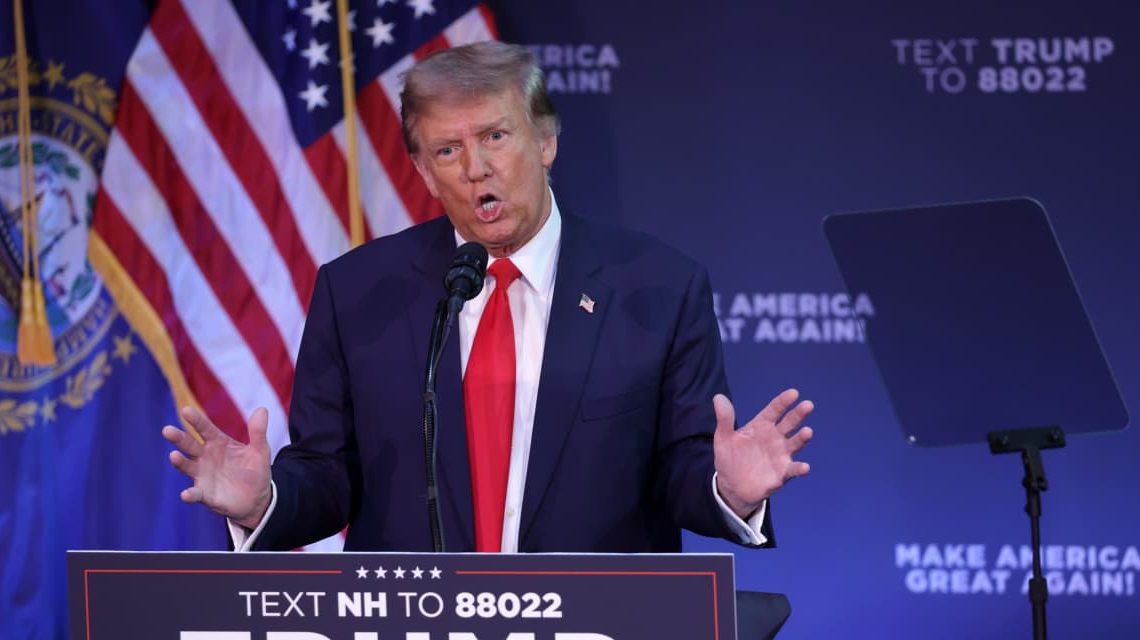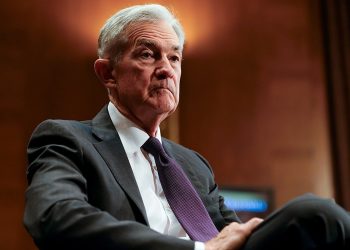Former President Donald Trump’s signature legislative achievement was a tax-cut package that padded corporate profits and helped power stocks to one record high after another, and, if he’s re-elected, investors may well be treated to a sequel.
Trump has an overwhelming lead in the Republican primary for president, and he and others on the political right are already planning how they can reduce corporate taxes further.
The 2017 tax-code overhaul cut the top corporate rate from 35% to 21% (various deductions often mean companies pay a much lower effective tax rate), and on the campaign trail Trump has promised to lower it even further — to 15%.
That would represent an even steeper cut than would the 18% rate proposed by the Heritage Foundation in its Mandate for Leadership, a guide published ahead of presidential election years that synthesizes the conservative movement’s policy goals.
From the archives (September 2023): ‘Project 2025’: Heritage Foundation helms right-wing coalition in drafting playbook to overhaul U.S. government on ‘Day 1’ of next Republican presidency
Analysts believe that a Trump victory in November would likely mean that Republicans did well enough down the ballot to take back the Senate and maintain their narrow House majority, giving them a governing trifecta similar to that which passed the tax-code changes in 2017.
The promise of a fat new tax cut may be one reason some business executives at last week’s World Economic Forum in Davos were willing to predict a Trump victory in media interviews last week, and investors could be forgiven for salivating over the possibility after their experiences with the 2017 tax cut.
The measure helped reduce the tax burden for American owners of businesses large and small, but was particularly generous for the large multinational firms that compose the S&P 500
SPX,
given their outsized profits.
The median effective tax rate for S&P 500 companies fell from 31.2% in 2017 to just 20% in 2018, according to John Butters, senior earnings analyst at FactSet.
In the first quarter that the new tax law was effective, the changes saved S&P 500 companies $12.8 billion in taxes, according to a 2018 Bloomberg analysis.
Critics observed that companies plowed the lion’s share of their tax savings into share buybacks, not, as hoped, into expanding their businesses and hiring new workers.
From the archives (August 2023): Stock buybacks spur wealth inequality and stifle innovation. Should they be banned?
Also see (April 2023): Here’s what Biden’s 1% buyback tax has done to stock prices so far in 2023
Google parent Alphabet Inc.
GOOG,
GOOGL,
realized $1 billion in savings in that quarter alone, while Bank of America Corp.
BAC,
saved $709 million. Netflix
NFLX,
saw its effective tax rate fall from 20% to 3%, while Ford Motor Co.’s
F,
fell from more than 12% to just 3%.
The changes helped make stocks look cheap by historical comparison, with the price-to-earnings ratio of the S&P 500 falling from 20.85 to 17.62 from 2017 to 2018, according to FactSet.
While a Trump victory could be bullish for stocks, the outlook for bonds is somewhat different, given that another round of corporate tax cuts would help add to an already soaring federal budget deficit.
The 2017 tax package, which Republicans argued would pay for itself as increased economic activity also boosted tax receipts, was passed in a much different macroeconomic environment.
The Federal Reserve had only just begun raising interest rates when the law was passed and consumer prices were rising at a modest 2% per year, putting little pressure on lawmakers to concern themselves with the federal deficit and debt, nor inflation.
Recently, of course, U.S. stocks — under Democrat Joe Biden — have been trading at historic heights, while inflation has fallen; recession, as of now, looks to have been staved off; and the consumer mood has brightened to a noteworthy degree.
Today, too, the federal-funds rate is at a more than 20-year high, while the government will pay upwards of $900 billion in interest costs to investors in U.S. government debt, up from $350 billion in 2021, according to David Kelly, chief global strategist at JPMorgan Asset Management.
“Rising interest payments have been the biggest reason for a sharp increase in the budget deficit recently,” Kelly wrote in a recent note to clients. “However, any attempt to reduce the deficit in the long run … would have to rein in spending on defense, Medicare, Medicaid and Social Security while raising taxes.”
Without those measures, “the deficit and debt will continue to worsen, gradually adding to the underlying level of real interest rates” and putting downward pressure on bond prices, Kelly added.
Trump won the presidency in 2016 after, unlike many Republicans, opposing cuts to Social Security and Medicare, and it appears that the Republican Party has adopted this message more broadly following several unsuccessful campaigns to cut such entitlement spending.
Heritage’s Mandate for Leadership may be instructive in this regard. The 2017 version called for aggressive reforms to Medicare by changing the program to one where the government gives seniors a fixed amount of money to help buy insurance and also argued for raising the Social Security retirement age.
The report published ahead of the 2024 election drops those suggestions, and Trump’s opponents in the Republican primary shied away from any detailed explanation of how spending should be cut to finance further tax reductions.
Read on: New Hampshire GOP primary: Haley tries to turn the tide, as Trump cruises toward the 2024 nomination
Also: Fake Biden phone call instructs New Hampshire supporters to skip Tuesday primary
Read the full article here









